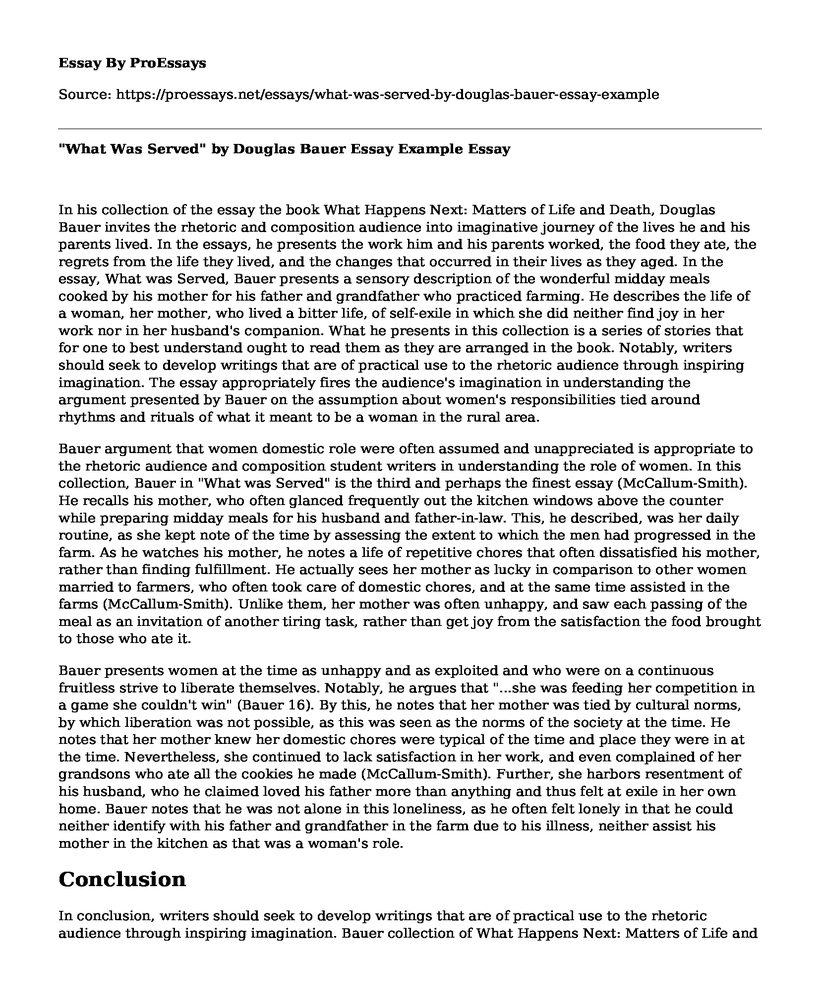In his collection of the essay the book What Happens Next: Matters of Life and Death, Douglas Bauer invites the rhetoric and composition audience into imaginative journey of the lives he and his parents lived. In the essays, he presents the work him and his parents worked, the food they ate, the regrets from the life they lived, and the changes that occurred in their lives as they aged. In the essay, What was Served, Bauer presents a sensory description of the wonderful midday meals cooked by his mother for his father and grandfather who practiced farming. He describes the life of a woman, her mother, who lived a bitter life, of self-exile in which she did neither find joy in her work nor in her husband's companion. What he presents in this collection is a series of stories that for one to best understand ought to read them as they are arranged in the book. Notably, writers should seek to develop writings that are of practical use to the rhetoric audience through inspiring imagination. The essay appropriately fires the audience's imagination in understanding the argument presented by Bauer on the assumption about women's responsibilities tied around rhythms and rituals of what it meant to be a woman in the rural area.
Bauer argument that women domestic role were often assumed and unappreciated is appropriate to the rhetoric audience and composition student writers in understanding the role of women. In this collection, Bauer in "What was Served" is the third and perhaps the finest essay (McCallum-Smith). He recalls his mother, who often glanced frequently out the kitchen windows above the counter while preparing midday meals for his husband and father-in-law. This, he described, was her daily routine, as she kept note of the time by assessing the extent to which the men had progressed in the farm. As he watches his mother, he notes a life of repetitive chores that often dissatisfied his mother, rather than finding fulfillment. He actually sees her mother as lucky in comparison to other women married to farmers, who often took care of domestic chores, and at the same time assisted in the farms (McCallum-Smith). Unlike them, her mother was often unhappy, and saw each passing of the meal as an invitation of another tiring task, rather than get joy from the satisfaction the food brought to those who ate it.
Bauer presents women at the time as unhappy and as exploited and who were on a continuous fruitless strive to liberate themselves. Notably, he argues that "...she was feeding her competition in a game she couldn't win" (Bauer 16). By this, he notes that her mother was tied by cultural norms, by which liberation was not possible, as this was seen as the norms of the society at the time. He notes that her mother knew her domestic chores were typical of the time and place they were in at the time. Nevertheless, she continued to lack satisfaction in her work, and even complained of her grandsons who ate all the cookies he made (McCallum-Smith). Further, she harbors resentment of his husband, who he claimed loved his father more than anything and thus felt at exile in her own home. Bauer notes that he was not alone in this loneliness, as he often felt lonely in that he could neither identify with his father and grandfather in the farm due to his illness, neither assist his mother in the kitchen as that was a woman's role.
Conclusion
In conclusion, writers should seek to develop writings that are of practical use to the rhetoric audience through inspiring imagination. Bauer collection of What Happens Next: Matters of Life and Death is a masterpiece of work in which he presents various themes about life, mortality, and work. In the second and the finest story of his collection, What was Served, Bauer narrates the life of his mother who was unsatisfied with her role as a wife. He narrates the life of her mother, who lived a life marked with a repetitive pattern of domestic chores that instead of fulfilling her left her more resentful and lonely. He contrasts her life with the life of other women and explores her life as a married woman not only to his husband but to his father in law too. The essay is an appropriate illustration to both rhetoric and composition audience as it represents the theme of femininity with a specific timeframe.
Works Cited
Bauer, Douglas. "What Happens Next." What Happens Next?: Matters of Life and Death, U of Iowa P, 2013.
McCallum-Smith, Susan. "The Stewards of Ultimate Things: Douglas Bauer's 'What Happens Next??" Los Angeles Review of Books, 16 Nov. 2013, lareviewofbooks.org/article/the-stewards-of-ultimate-things-douglas-bauers-what-happens-next/#!. Accessed 1 Apr. 2019.
Cite this page
"What Was Served" by Douglas Bauer Essay Example. (2022, Dec 12). Retrieved from https://proessays.net/essays/what-was-served-by-douglas-bauer-essay-example
If you are the original author of this essay and no longer wish to have it published on the ProEssays website, please click below to request its removal:
- Irony, Foreshadowing, and Symbolism in The Lottery
- Critical Essay on Oedipus the King
- The Odyssey Book XI Close Reading and Critical Analysis
- Comparison of The Movie the Wizard of Oz and The Book the Wonderful Wizard of Oz Essay
- Essay Sample on The Ballad of Birmingham: Revealing Injustices of 1969 Church Bombings
- Literary Analysis Essay on "Everyday Use" and "Dead Men's Path"
- Essay Example on Hatred and Racism in Othello: An Unanswered Question







